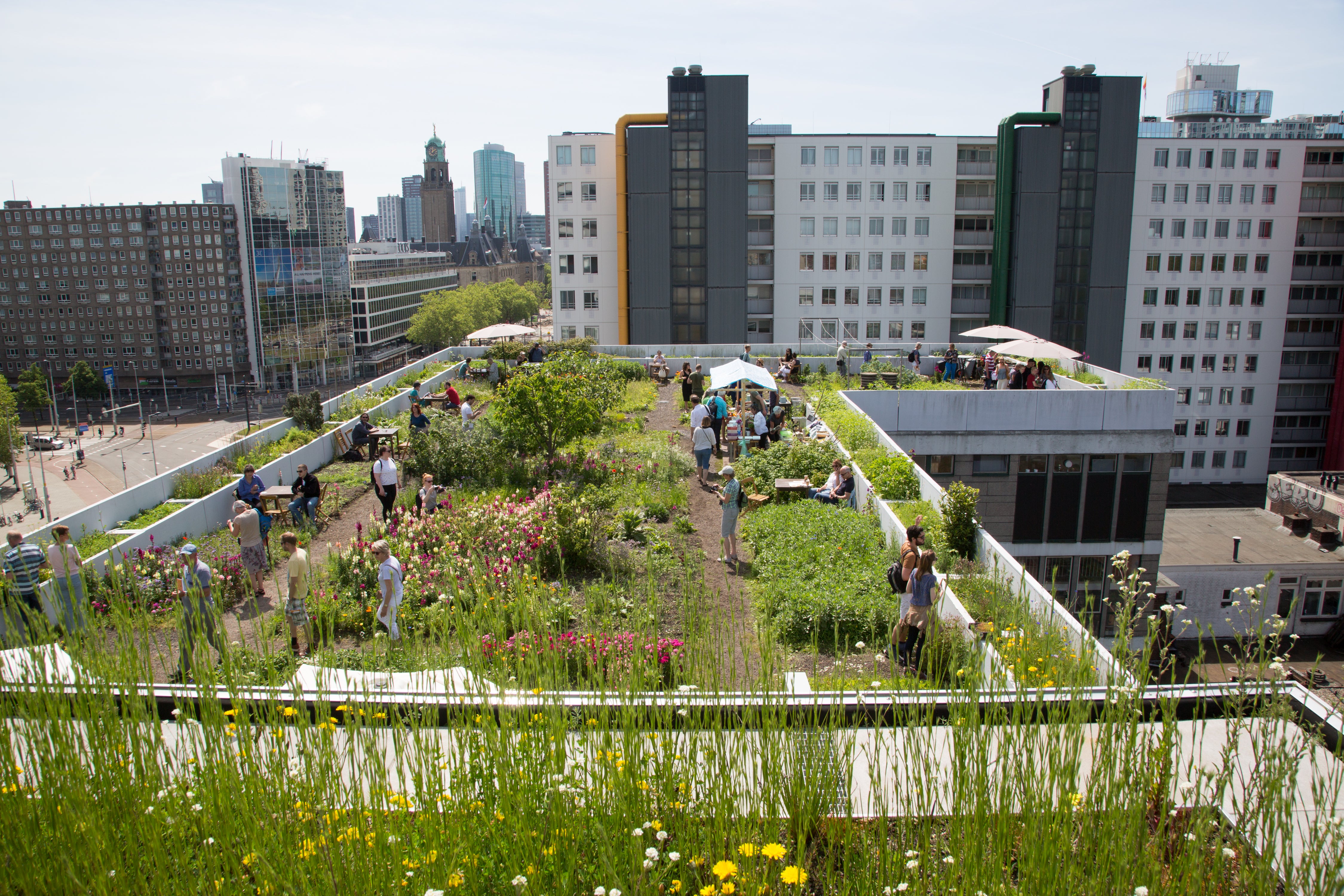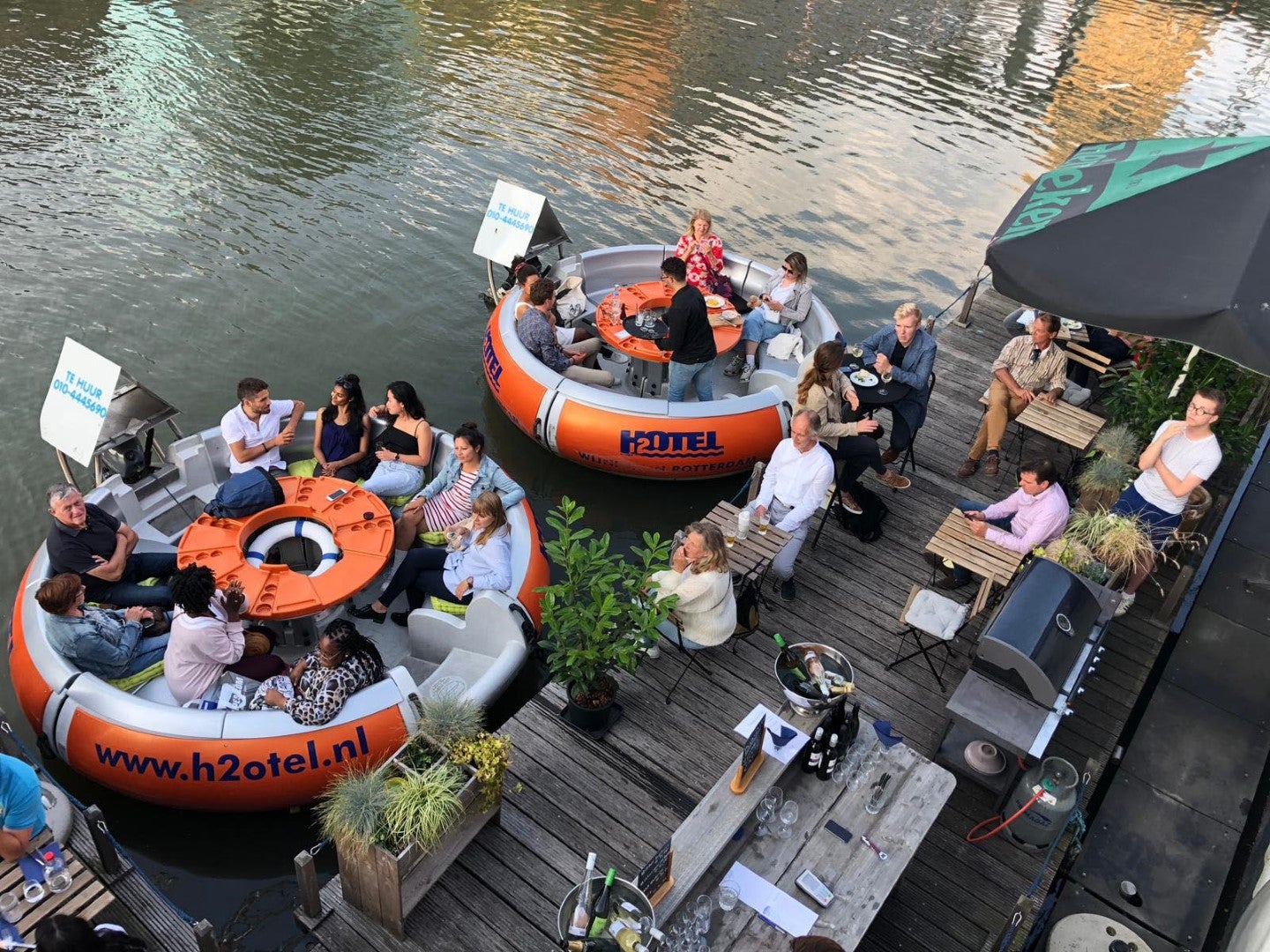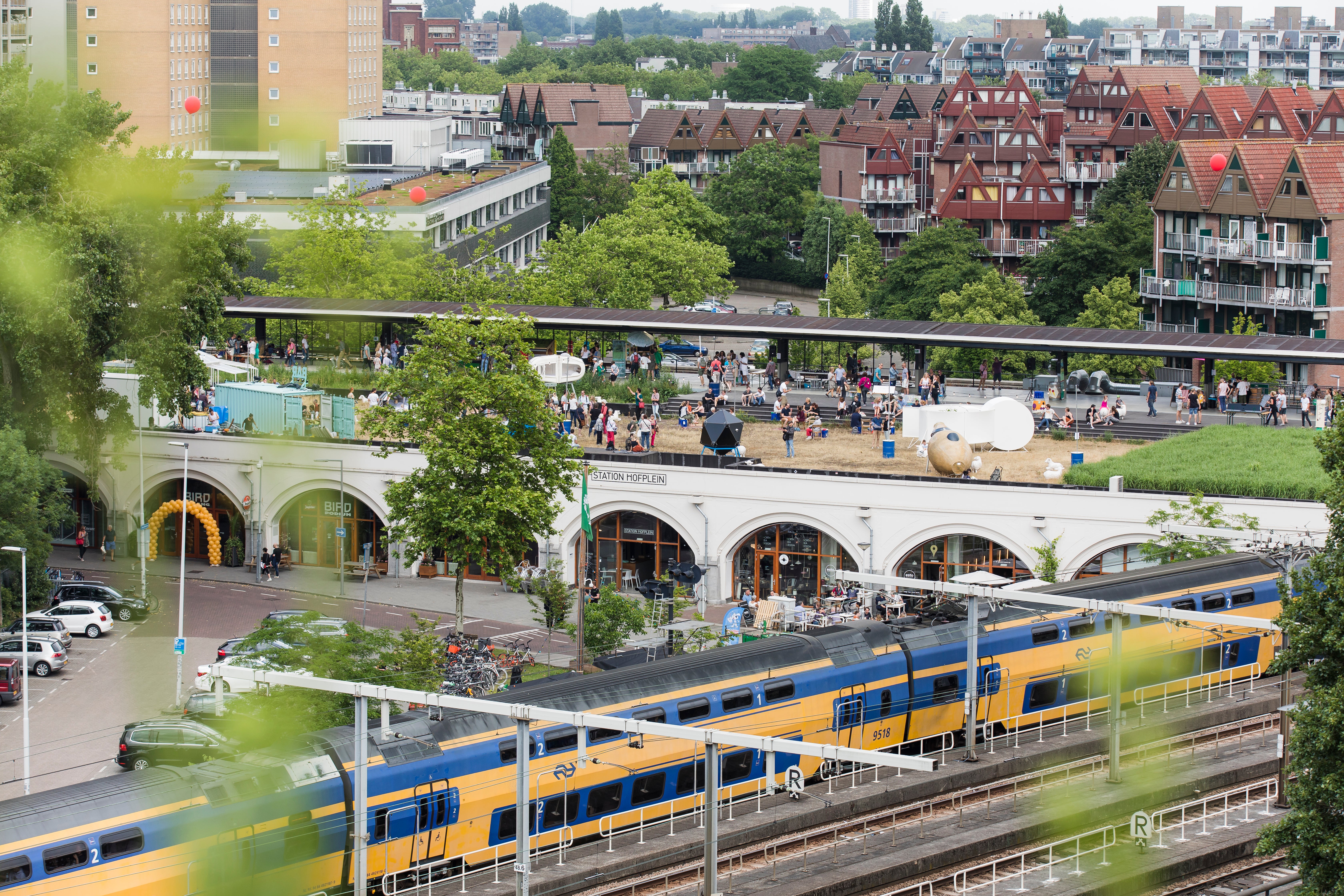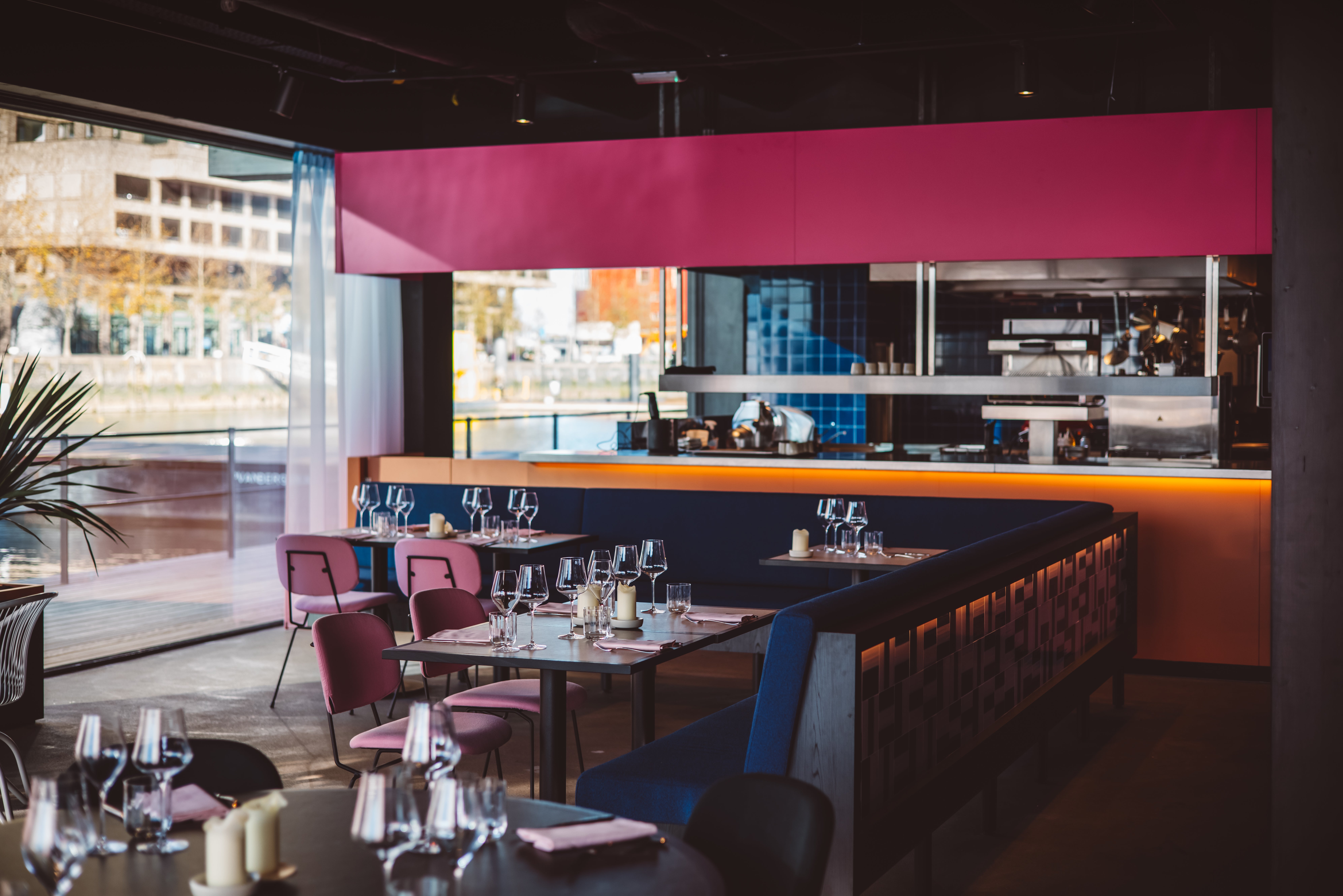The Independent's journalism is supported by our readers. When you purchase through links on our site, we may earn commission.
How Rotterdam’s funky, climate-adapted architecture is putting it on the tourist map
From rooftop walks to floating rooms, the Netherlands’ second city is responding to rising sea levels by remodelling its skyline in the most innovative of ways, finds Deborah Nicholls-Lee

The agricultural scene before me is typically Dutch: tulips and narcissi tilt towards the sun, rows of vegetables peep their frilly heads through the earth, and chickens peck for snacks in the soil. Only I’m in the heart of urban Rotterdam. I’ve just crossed the Coolsingel’s six lanes of traffic and climbed the concrete steps of a 1960s office block to a rooftop seven floors up.
The 1,000m² DakAkker (roof field), home to bustling brunch cafe Teds, is the largest rooftop farm in the Netherlands, serving local businesses with fresh produce, generating solar energy, and storing 9,000l of rainwater to reduce flooding and quench droughts. From roofs such as this visitors can marvel at the patchwork city; the mirrored skyscrapers and brutalist behemoths dwarf the few remaining monumental buildings, acting as contrasting emblems of Rotterdam past and present.
Best known for its dramatic architecture which sprang from the ashes of Second World War devastation, the Netherlands’ second-largest city now faces a new threat as sea level rise, caused by global warming, once again tests the city’s resilience. Yet Rotterdam’s innovative solutions to the challenges it faces only make it more of a destination.

The Depot building, for example − a colossal mirrored bowl brimming with art treasures, whose tiny footprint is designed to withstand flooding − won a clutch of awards when it became the world’s first publicly accessible art depository last year, housing the Boijmans Van Beuningen’s vast collection of Dutch works while the water-logged museum is remodelled. The Depot has no rooftop allotment; it has a forest instead.
High and dry is a good thing when your city has one of the greatest flood risks in Europe, and Rotterdam’s Rooftop Days Festival (May/June) is an annual celebration of sky-high life with rooftop concerts, camping, dining and dancing; and this year a breathtaking Rooftop Walk, featuring specially designed air bridges connecting the roofs of iconic buildings downtown.
Come in June and you’ll also catch Rotterdam Architecture Month. Headlining is The Podium, a temporary rooftop stage on the architecture and design museum Het Nieuwe Instituut, accessed via a striking exterior staircase spanning the building like a neon pink sash.
Visitors can marvel at the patchwork city; the mirrored skyscrapers and brutalist behemoths dwarf the few remaining monumental buildings
But fancy roofs are not just about attracting visitors. With a flat roofscape of 18km², the city also sees regreening at altitude as mitigation against global warming. “Eighty-five per cent of our city is below sea level – that stresses the need to be climate adaptive,” explains vice mayor Vincent Karremans. “One of the ways we can do that is to add more green.”
Seven projects – high and low – costing over €300m (£254bn) will transform this car-centric city, adding 100,000m² of parkland within a decade. As well as boosting tourism, the new landscape will capture more CO2, reduce heat stress, promote biodiversity and absorb an estimated 4,400m³ of floodwater. “It helps us achieve many goals in one,” says Karremans.
In the Delfshaven district, visitors can now take a guided tour through the city’s eight-hectare Dakpark, a rooftop park with a herb garden, beehives and free-roaming sheep, which has become a popular local hangout. Meanwhile, snaking over north Rotterdam, and visible from my vantage point at the DakAkker, is a disused railway viaduct being converted, thanks to local architects De Urbanisten, into the climate-adaptive Hofbogenpark – a 2km-long verdant walkway with water features due to open in 2024.

Huddled beneath the viaduct’s 189 arches, there’s already heaps to explore. Sample a staple of the Dutch diet at We Say Cheese; spend an evening at BIRD, a music venue with restaurant and garden; or browse the vinyl at Clone Records and De Oorzaak. This once seedy part of town now even has its own Michelin-starred restaurant, FG Food Labs.
For climate-friendly cuisine, try Aloha in the Kralingen district, a restaurant with a low-waste concept located within a derelict 1980s tropical swimming paradise, now part of Blue City, a hub for sustainably minded entrepreneurs. The inventive sharing plates keep coming, including a vegetarian take on Dutch bitterballen (breadcrumbed balls with a gooey centre) made from oyster mushrooms grown on coffee grounds and served with a − surprisingly tasty − coffee mayonnaise dip (€6.50).
From here, I board an electric water taxi for an exhilarating ride beneath the harp-shaped Erasmus Bridge and upstream to the Rijnhaven, a peaceful harbour exploring ways of working with the ubiquitous water that both defines Rotterdam and endangers it. A €70m redevelopment project is underway here to create 18 hectares of tidal parkland with city beaches and floating parks, as the land use evolves from industrial to ecological and social.

Across the water, I spy Wikkelboats: tiny floating houses built using recycled cardboard − some with hot tubs − and the latest trend in climate-adaptive accommodation here.
There’s more floating fun to be had in the Wijnhaven to my north. The floating H₂OTEL has buoy-shaped boats with bars which can be skippered around the harbour, while eccentric gastro pub and gig venue V11, a 1950s beacon-topped “lightboat” painted fire-engine red, rents out electric hotTugs − steerable steaming-hot jacuzzis that keep passengers warm whatever the weather.
Back in the Rijnhaven, the only hint of the district’s tawdry past is the cheekily named restaurant Putaine (prostitute), where I enjoy a glass of champagne. Furnished in blushing pink and bestowed with a natural swimming pool, the chic, glass-walled establishment forms part of a giant timber-built floating office complex, home to the international HQ of the Global Center on Adaptation.
The city has been undersold for so long, it’s no wonder it wants to shout from the rooftops
For dinner, though, I’m off to Putaine’s big sister, Héroine, back on the mainland. Here I sit down to a five-course menu (€58) featuring melt-in-the-mouth amuse-bouches and a knockout dessert of apple sorbet, peanut cream and crispy beetroot – all served in an inauspicious (but listed) hulk of a building typical of the functionalist architecture that is everywhere here and all too easy to misjudge.
In fact, the city has been undersold for so long, it’s no wonder it wants to shout from the rooftops. “We’ve really come a long way in the last 20 years in Rotterdam,” says Léon van Geest, director of Rotterdam Rooftop Days, as we tour the Groene Kaap housing development in Katendrecht, recently voted the best roof in the Netherlands. “It’s not something only for the tourists, but for Rotterdam people to be proud of their city.
“When you are on the rooftops, you’re like: ‘This is my city. Wow.’”

Travel essentials
Getting there
A direct Eurostar service from London reaches Rotterdam in around four hours.
Staying there
Deborah stayed at The Slaak Rotterdam and was hosted by Rotterdam Partners. theslaakrotterdam.nl
More information
The Rotterdam Rooftop Walk runs from 26 May to 24 June 2022. Rotterdam Architecture Month runs throughout the month of June, but the Podium will remain open until 17 August.
Join our commenting forum
Join thought-provoking conversations, follow other Independent readers and see their replies
Comments


Bookmark popover
Removed from bookmarks